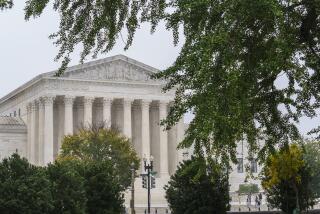Criminal charge filed in libel case
- Share via
FORT COLLINS, COLO. — Locked in a visitation dispute with his former girlfriend over their young daughter, J.P. Weichel wanted to vent, court records say.
Weichel, 40, allegedly posted comments about the woman on the Craigslist “rants and raves” forum, accusing her of child abuse and welfare fraud and making crude comments about her sex life.
The woman said the postings were defamatory. But unlike the majority of libel cases, which are tried in civil court, local authorities have taken the unusual step of charging Weichel with a crime.
Colorado is one of a dwindling number of states with a criminal law against libel. The statute dates to the 19th century and is rarely used.
But Larimer County Dist. Atty. Larry Abrahamson said Colorado’s statute applied precisely to what Weichel was accused of doing.
“This is what the Legislature of the state of Colorado has determined is criminal,” Abrahamson said. “We’re obligated to enforce the laws in the state of Colorado.”
Weichel could not be reached for comment, and his lawyer, Michael Liggett, has a policy of not speaking with reporters, an assistant in his law office said.
But several lawyers said the case should be handled in civil court. Bringing the government into the dispute, they said, is a troubling infringement on free speech.
“Being a jerk isn’t necessarily grounds for felony prosecution,” said Mark Silverstein, legal director of the American Civil Liberties Union of Colorado.
Gregory Lisby, a communications professor at Georgia State University, has tracked criminal libel prosecutions. He said the states that retained such statues -- there are 17, according to free-speech groups -- had simply not updated laws from English common law.
Criminal libel prosecutions are “a sledgehammer when a scalpel would do the same trick,” Lisby said.
His research shows that criminal libel cases have dropped, but the Internet could reverse that, he said. People don’t realize that scathing postings or e-mails can make them liable for defamation charges.
“More and more people view the online world as a free-rant place,” Lisby said. “They think it’s par for the course, but they’re setting themselves up for lawsuits” or prosecution.
In civil libel cases, truth is the best defense and the dead cannot be libeled. But Colorado’s criminal statute holds that it is illegal to “blacken the memory of one who is dead.” Truth is not a defense in such cases, or in ones that “expose the natural defects of one who is alive.”
The state Supreme Court upheld the law in 1991 but said its provisions would not apply to constitutionally protected political speech. In 2006, the ACLU successfully blocked the Greeley Police Department from using the statute to pursue a blogger who posted material critical of a professor at the University of Northern Colorado. The ACLU argued that prosecution would violate the 1st Amendment.
Police and court records say Weichel’s postings were purely personal.
Weichel’s former girlfriend contacted police in Loveland last December about anonymous postings that referred to her sometimes by her nickname and other times by her full name.
A police report said the postings alleged that she abused her child and concealed it from social workers, and that she committed welfare fraud and worked for a “crooked” Fort Collins lawyer whom she sexually serviced. The postings were laced with crude references to her body.
The woman told police that people who knew her read them and tried to defend her in online comments.
Police traced the postings to a computer that Weichel had access to. In August, Loveland police questioned Weichel at his workplace.
“Weichel stated he was ‘just venting,’ ” according to an affidavit for an arrest warrant.
Abrahamson’s office filed two criminal libel charges against Weichel on Oct. 21. The state’s libel law carries a maximum sentence of 18 months in jail.
As news of the prosecution circulated, it prompted critics of the law to call for a revision. David Lane, a 1st Amendment lawyer in Denver, said prosecutors almost never used the law because they knew it could easily be stricken by a federal court.
“It’s shocking the statute exists,” Lane said, “and that someone’s even using it is more shocking.”
--
More to Read
Sign up for Essential California
The most important California stories and recommendations in your inbox every morning.
You may occasionally receive promotional content from the Los Angeles Times.









